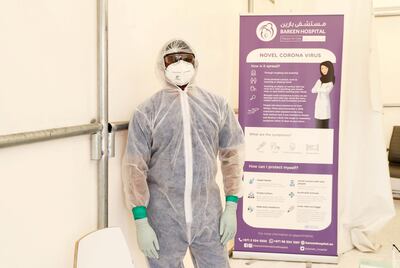A frontline nurse in the UAE has returned to work to continue testing hundreds of residents just days after recovering from coronavirus.
Nikhil Rajendran, 30, began screening workers across Abu Dhabi in March as part of a government drive to diagnose infections and reduce Covid-19’s spread.
After six weeks of taking hundreds of swabs, the healthcare worker began to feel ill himself and recognised he may have contracted the virus too.
A test soon confirmed his worst fears and he was forced to self-isolate, but more than a month later he is back at work doing the job he loves.
“When the virus was diagnosed, I could feel the pain of being a patient as well as the stress of being a healthcare worker in this situation,” said Mr Rajendran.
“I had severe pain across my body, a fever, cough and sore throat. I was sure it was Covid-19 as I had seen so many people with the same symptoms.
“The doctor tested me as soon as he knew. I was not afraid after he reassured me, so I asked when I could go back to work to continue my service.”
Mr Rajendran, from India, has lived and worked in the UAE since March 2018.
He described wanting to become a nurse after witnessing an horrific bus crash as a 16-year-old near his home in Kerala.
The experience stuck with the teenager and later inspired him to enter the medical profession – a decision he has never regretted.
He usually works at Bareen International Hospital in Abu Dhabi, but the Covid-19 pandemic has got him travelling across the city to assist with testing.
"At first I was worried about going into these areas," he told The National.
“But I thought if I can show the workers my positive attitude and that I am not afraid, then they will also have no fear.
“When I received each patient I tried to talk to them to reduce their stress and explain what was happening.
“I explained what Covid-19 was and tried to keep them calm before I tested them.
“We can’t always assume everyone knows what is happening. I have felt an urge to support my colleagues and patients with the virus since this started.”
Mr Rajendran began to feel unwell on April 23 and underwent a swab test. Two days later he was detected Covid-19 positive and asked to quarantine.
The unmarried man, who lives in Mussaffah, informed only his father of the diagnosis to avoid panic spreading among rest of the family members.
“My father is my best friend. I knew I could trust him and his words would reassure me,” he said.
“He told me to stay calm and not be afraid. I knew I had to be strong and it helped me believe I would be OK.
“Now I’m back at work, I want to show other people they have nothing to fear and can recover as I have.
Mr Rajendran believes nurses can help in creating awareness about the pandemic among working-class population.
"Nursing is so important to me. When I visit the [worker] camps it is important the workers know the value of hand washing and improving their hygiene.
“I tell them the importance of wearing a face mask too.”
Dr Jasem Alhashmi, head of Dubai Hospital’s cardiology department, said healthcare workers were more likely to pick up the virus.
In an online blog published in the Dubai Medical Journal, Dr Alhashmi recorded his experiences working alongside testing staff inside the Warsan Covid-19 isolation and quarantine centre in Dubai.
“The risk of transmission between healthcare providers and patients is higher for those seeing and testing the patients for the first time, compared to those following up the patients in the Covid wards,” he said.
“None of the Covid ward team have been tested positive so far, but a high number of medical doctors have tested positive because they were the first to get exposed to the patients.
“This is a sign for the vastly difficult working conditions for healthcare workers."

















